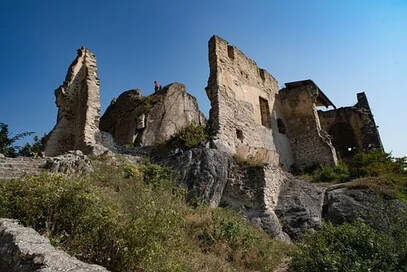
It’s mind-numbing to see the life you once knew reduced to matchsticks and mildew. You can’t point to a favorite restaurant and reminisce about dining there. You can’t go down a familiar street and see the storefronts of your favorite shops. You can’t drive into your neighborhood and wave at friends. You can’t even pull up to your own house because your driveway ends in front of a debris pile. For the returning Israelites, a 70-year-old heap of stone was the rubble that greeted them. No wide streets filled with laughing children. No busy marketplace with vendors hawking their wares. No passing by the familiar. Nostalgia was only for memory, not for reliving. Instead, the crumble of broken walls surrounded the city that was once secure within its gates. The city itself was wiped out, a mere shell of its former self. At its center, the temple of God lay in ruin, stripped of its carvings, jewels, and precious metals. Haunting lamentations and the echo of dirges hummed upon the wind. All that was bare and bleak sprawled before this tired group.
The task of rebuilding was daunting, but it was for that purpose that these people had returned, bringing with them a younger generation, whose strong backs were not weakened by the memories of what used to be and whose visionary eyes were not blinded by the city’s former glory. Eager to work, they saw only what was ahead, and their energy, hope and enthusiasm were fueled for recovery. These fearless Hebrews who had traveled 4 months, walking 900 miles from Babylon to Palestine, knew what they were returning to, but the possibilities of what they could accomplish overrode the disappointment of what they faced. That resilience put in motion practices that can help anyone rebuilding from the brokenness of life.
1. They acknowledged their God. Their journey had been made with God in mind. Freedom of worship was at the forefront of their cause. Our recovery begins with God is established in first place in our hearts and our confidence in Him is settled.
2. They secured their identity. For the Israelites this meant finding proof of everyone’s lineage so that the priestly roles could be filled. For us it means anchoring ourselves in the truth of who we are. Identity is a fragile thing, and it can quickly become unraveled if it’s placed in the temporal things that storms destroy. The stabilizer that moors identity is the unchanging Word of God. Knowing who God says we are is the surest foundation on which to build recovery.
3. They rebuilt their altar. When we are in recovery mode, we can feel weak and vulnerable. Challenges that we once anticipated can become overwhelming. We need supernatural strength. An altar of prayer provides the surrender of our weakness to the superiority of God’s strength, and we find “I can do all things through Christ which strengtheneth me,” Philippians 4:13.
4. They kept their feasts. Feasts were celebratory times that connected the people with one another and with their God. Hebrews 10: 25 admonishes “Not forsaking the assembling of ourselves together, as the manner of some is; but exhorting one another: and so much the more, as ye see the day approaching.” There’s something about sharing the load with one another that lessens the pain and strengthens the determination. Keeping encouragement, especially spiritual encouragement, alive is so important. It is a gift we both give and receive to propel and enhance recovery efforts.
5. They gave money and food and supplies to support the labors beyond their own strength. Like the Hebrews, we have limits. We can’t do everything for everyone, but we can offer some kind of support. I’ve seen 18-wheelers of supplies roll in from neighboring states, and electrical workers, church groups, and the Cajun Navy, sweep in to feed the stranded, the hurting, and the helpers. There’s always something we can do to aid recovery.
While I’ve read Ezra before, I never FELT it quite like I did today as within its story were answers for our present situation…and answers we all need when we are rebuilding with a greater future in mind.
Tip/Tidbit: What you do today can be a part of a glorious future.
 RSS Feed
RSS Feed
